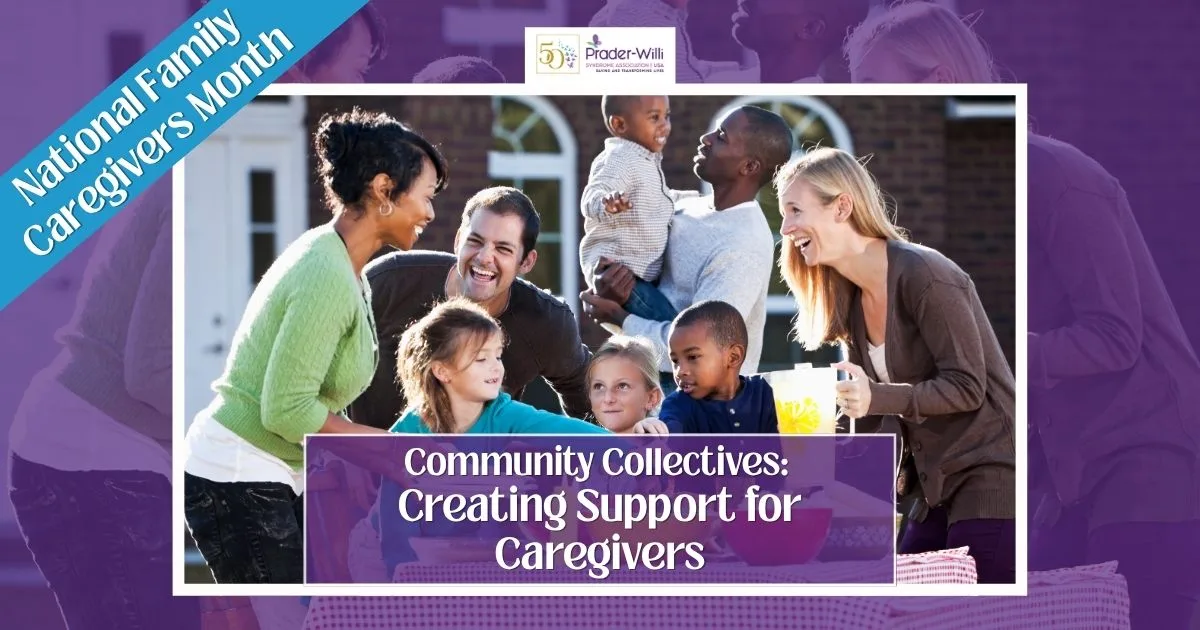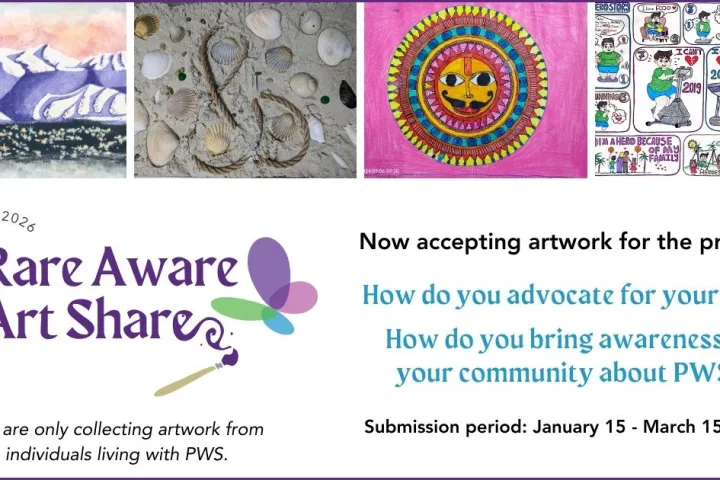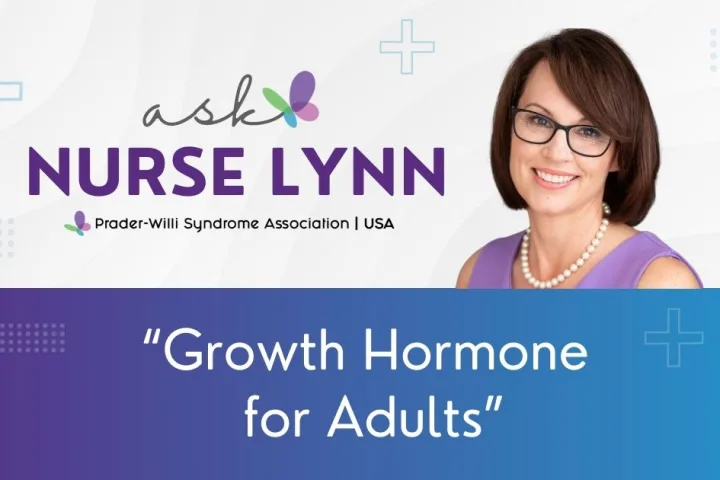November is National Family Caregivers Month, a great opportunity for our community to reflect, discuss, and take action on caring for our caregivers. Family caregivers are the parents, grandparents, siblings, and other family members who care for individuals with PWS in the home. Family caregivers are recognized for their incredible care, dedication, time, and often sacrifice involved in caring for an individual with a disability, whether they are newborn or elderly. We celebrate this month, not to dwell on the challenges of being a family caregiver, but to recognize the need of caring for the caregiver as well.
It Takes a Village
Self-care is a common phrase increasingly tossed around in circles and communities where needs are not being met. At PWSA | USA, we have used it often and will continue to do so because we think it is an important part of this PWS journey. We also recognize we can’t stop at self-care. As Nakita Valerio, a Toronto-based community organizer says, “Shouting ‘self-care’ at people who actually need ‘community care’ is how we fail people.”
Many people may find that they live in communities where support and services for families with disabilities are few or hard to find. There may be a program to help families find respite care, but with a small number of reliable respite caregivers to offer. It is unlikely there is an official meal program or childcare cooperative that could benefit your family. As federal funding is withheld, cut, or restructured, it is less likely. This may be an important time for community members to come together to create unofficial co-ops of service and respite. With a little work up front, some creativity and dedication, and a small network of caregivers, communities can create lifelines of support and respite among families.
What might that look like?
- *Parenting/caregiver co-ops to share and receive caregiving services.
- *Ride share with neighbors to get kids to school or run errands.
- *Meal shares amongst neighbors and friends.
If these groups or services don’t yet exist in your neighborhood, connect with a like-minded friend or neighbor to discuss what it may look like for your families. Reach out to some friends to discuss what your family’s needs are and how it may look to support each other.
Is it childcare? You could each take a few hours every week or month to supervise children or the individuals with PWS, giving each caregiver a bit of time to run errands or, hopefully, have some time to relax or participate in an activity they enjoy.
Maybe it’s finding a parent or two in your neighborhood that drives to the same school as your family. Can you take turns or choose a few days a week to alternate driving? Even an extra 20 minutes or skipping a drive to school can help recharge a caregiver.
Perhaps you and a friend can create a meal share where on a specific night of the week one family makes enough for two families. This allows each family one night a week where they are free to spend that time as they need or want. Do you make a delicious pot of chili? Double the batch and share it with your friend. Does your neighbor have a great recipe for lasagna? Ask if they’re interested in starting a meal share with you. If it’s successful, tell your other friends and watch how it might grow.
Supporting your caregiving journey may involve some planning and organizing on your part, but when you bring other families and caregivers into the fold, you can discuss and learn how best to support each other. Remember to reach out to friends who may not have children or children with disabilities. Grow the community, grow the support.
The People’s Self Care
While we recognize that popular images self-care may not always be attainable because of lack of childcare, time, or resources, it is still an important part of the conversation for National Family Caregivers Month. We encourage caregivers to prioritize themselves if even for a moment or in a minor way. Below are some ideas that hopefully all caregivers may find easy enough to implement.
- *Wake up 15 minutes early to sit with a cup of coffee or tea. You could take this time simply sit in silence and reflect, read a book, listen to music, or watch your favorite comedian for some laughs to start the day.
- *Take a bath rather than a shower. Include some candles and pleasant-smelling bath salts.
- *Before bed, write down 3 things you are grateful for from that day.
- *Need a nap? Have an impromptu family movie time to keep children entertained while you snooze under some blankets on the couch.
- *If you can’t take time away from someone you care for, try taking a walk with them to play “sound scavenger hunt,” encouraging them to walk silently to observe the sounds they hear. Offer a prize for the most sounds heard if needed. The idea is that they are walking and strengthening their listening skills, and you get to walk in relative silence.
- *Take your adult loved one to a BINGO night or a safe, structured activity with no food. Ask a friend who loves BINGO to join them while you sit in the car and read a book or go meet another friend for dinner down the road.
Remember that community and personal connections are an important part of our mental health. Invite friends on walks with you and your loved one, or have them over for coffee in the morning, or a glass of wine at the end of the day after your loved one goes to bed or they are distracted by a movie. Find a trusted caregiver if you can and go out dancing or join a book club. Self-care is not always about being alone or having time away. Sometimes self-care is about stepping into the circle of your friends and community.
Below are some of the ways our caregivers on staff practice self-care:
“Going for a walk and listening to music really loud to tune out all the outside noise.
Song choice is critical. It’s free and makes me feel so much better.” – Kristi Rickenbach
“I run 2-5 miles daily to relax and recharge.” – Charles Conway
“Every Tuesday we go to our local Mexican restaurant for Taco Tuesday. No one in my family has to cook or clean and the tacos are $1.50 each, which is very affordable. My girls and I also love to do puzzles while we listen to creepy podcasts. It’s not time to myself but it’s very pleasant and recharging, an enjoyable time with my girls with no expectations or duties on my part.” – Anne Fricke
“I love to walk the trails around my house. I get my nails done (ummm, more than I should) and my greys colored. This brings me sanity.” – Angela Frazier
“Leave on a Sunday for a couple of hours to either get a massage or mani / pedi or get a drive thru of something I usually can’t get. Lately I have been doing smash rooms. Its sooo therapeutic.” – Sarah Kasaby
“I love to ‘hang out’ with my grandkids – a walk in the woods or time at the pool. A great way to decompress.” – Elaine Towle
Share this!





 Perry A. Zirkel has written more than 1,500 publications on various aspects of school law, with an emphasis on legal issues in special education. He writes a regular column for NAESP’s Principal magazine and NASP’s Communiqué newsletter, and he did so previously for Phi Delta Kappan and Teaching Exceptional Children.
Perry A. Zirkel has written more than 1,500 publications on various aspects of school law, with an emphasis on legal issues in special education. He writes a regular column for NAESP’s Principal magazine and NASP’s Communiqué newsletter, and he did so previously for Phi Delta Kappan and Teaching Exceptional Children. Jennifer Bolander has been serving as a Special Education Specialist for PWSA (USA) since October of 2015. She is a graduate of John Carroll University and lives in Ohio with her husband Brad and daughters Kate (17), and Sophia (13) who was born with PWS.
Jennifer Bolander has been serving as a Special Education Specialist for PWSA (USA) since October of 2015. She is a graduate of John Carroll University and lives in Ohio with her husband Brad and daughters Kate (17), and Sophia (13) who was born with PWS. Dr. Amy McTighe is the PWS Program Manager and Inpatient Teacher at the Center for Prader-Willi Syndrome at the Children’s Institute of Pittsburgh. She graduated from Duquesne University receiving her Bachelor’s and Master’s degree in Education with a focus on elementary education, special education, and language arts.
Dr. Amy McTighe is the PWS Program Manager and Inpatient Teacher at the Center for Prader-Willi Syndrome at the Children’s Institute of Pittsburgh. She graduated from Duquesne University receiving her Bachelor’s and Master’s degree in Education with a focus on elementary education, special education, and language arts. Evan has worked with the Prader-Willi Syndrome Association (USA) since 2007 primarily as a Crisis Intervention and Family Support Counselor. Evans works with parents and schools to foster strong collaborative relationships and appropriate educational environments for students with PWS.
Evan has worked with the Prader-Willi Syndrome Association (USA) since 2007 primarily as a Crisis Intervention and Family Support Counselor. Evans works with parents and schools to foster strong collaborative relationships and appropriate educational environments for students with PWS. Staci Zimmerman works for Prader-Willi Syndrome Association of Colorado as an Individualized Education Program (IEP) consultant. Staci collaborates with the PWS multi-disciplinary clinic at the Children’s Hospital in Denver supporting families and school districts around the United States with their child’s Individual Educational Plan.
Staci Zimmerman works for Prader-Willi Syndrome Association of Colorado as an Individualized Education Program (IEP) consultant. Staci collaborates with the PWS multi-disciplinary clinic at the Children’s Hospital in Denver supporting families and school districts around the United States with their child’s Individual Educational Plan. Founded in 2001, SDLC is a non-profit legal services organization dedicated to protecting and advancing the legal rights of people with disabilities throughout the South. It partners with the Southern Poverty Law Center, Protection and Advocacy (P&A) programs, Legal Services Corporations (LSC) and disability organizations on major, systemic disability rights issues involving the Individuals with Disabilities Education Act (IDEA), Americans with Disabilities Act (ADA), and the federal Medicaid Act. Recently in November 2014, Jim retired.
Founded in 2001, SDLC is a non-profit legal services organization dedicated to protecting and advancing the legal rights of people with disabilities throughout the South. It partners with the Southern Poverty Law Center, Protection and Advocacy (P&A) programs, Legal Services Corporations (LSC) and disability organizations on major, systemic disability rights issues involving the Individuals with Disabilities Education Act (IDEA), Americans with Disabilities Act (ADA), and the federal Medicaid Act. Recently in November 2014, Jim retired.